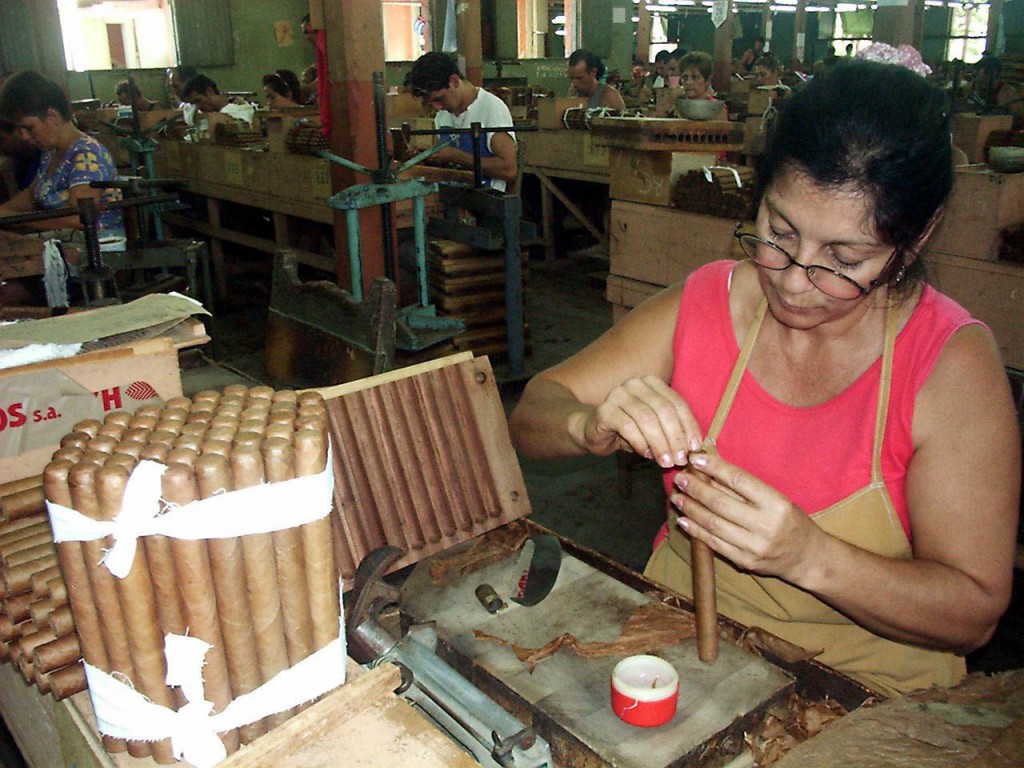
“If commerce between the United States (U.S.) and Cuba would have been normal, Americans would have still been the greatest consumers of Cuban tobacco in the world”, said Jorge Fernandez, vice president commercial of Habanos S.A.
If we are going to talk about blockade, we should say there is a before and an after the triumph of the Revolution. During 1949-1958, Americans were a natural market for Cuba; it received the 33 percent of the tobacco, what represented the 35 percent of the total incomes.
“The U.S. was the most important clients for the handmade rolled tobacco and a great quantity of leaves (raw material), which is used to elaborate the cigar in Tampa and Key West’s Tobacco Factories.
The economic, commercial and finance blockade imposed by the US against Cuba since 1962, diverted Cuba from that “sure port”, and consequently deprived the Americans of the pleasure to enjoy the taste, at least in a legal way, a unique product in the world.
The affectation has cost millions of dollars. “In normal conditions we would have been trading between 150 to 170 millions of Premium tobacco, which could represent about 380 million dollars a year.
“The US market is the nearest and has the logistics advantages. We currently sell the European Union (25 countries) about the 58 percent of our cigars with the negative consequences of the increase of in the prices of the charter fees; if we have into consideration that before, we traded the 33 percent to only one country, affectations are invaluable.”
At present 400 million units of Premium- with more than 3 grams completely handmade- are trade worldwide. “If we consider that from them all, about 270 millions are consumed in the US. We can conclude that our product has a greater presence than in 1969.
“But that obstacle called blockade just leaves us space for the rest of the market that moves around the 130 million cigars where the participation of Habanos S.A., is about the 73 percent in units and values of the 85 percent.
“If we apply these figures to the American market we could hope to get the 70 percent of participation in units and an 80 percent of in values, with the advantage it is geographically nearer, and so, charter fees would be less. Exports of cigars to far countries, like Europe and Asia need long distances of trading in air-conditioned containers or by plane with very expensive charter fees.
In two aspects
“I see the blockade in two aspects: operation costs for Cuba and those imposed by the government of the US who has to go beyond the frontiers to purchase products like the Habano cigar, the Cuban run or the coffee.
“We have valued the situation in case the US lifts the blockade, they should also abolish other laws in the US territory, and we could start trading our products. In the first years, we could sell about 50 million cigars and in ten years, we could have the market quota, because we would have to readjust the Americans to consume this type of cigar, due to the fact that for many years they have been consuming others from different flavors and strength.
“Nevertheless, Habanos S.A. has 27 trademarks of cigars with mixture that are able to catch the smoker of all tastes.”
From the agricultural view point, there are also affectations in tobacco production, said the commercial vice president from Habanos S.A.,: “Farming tobacco, is the among the greatest producers of Virginia variety –used to make cigarettes-, it has developed technologies and phytosanitary products which we do not have them in Cuba and we have to purchase them by third countries, so they are more expensive.
“That makes us thing producers in that country would be interested in exchange with ours, but the US government also penalizes farmers, who know that in Cuba there is high intellectual capacity, with professionals of first class, who in relation to the tobacco they farm had been able to produce varieties that resist illnesses that due to the geographic closeness attack the two countries. It would be an interesting exchange and not competitive because the tobacco that grows in the two countries have different destinations.”
Damages to the production of food
All the affectations caused by the economic, commercial and finance blockade to the Cuban agriculture reached 307, 367, 200 US dollars last year and the most affected branches are the productions of tobacco, pigs, beans, the ones cultivated in the mountains and vet drugs and vaccines.
Juan Jose Leon, specialist in Foreign Relations from the Ministry of Agriculture considers that the policy imposed by the US limits the possibilities to purchase products, technologies, machines and several consumables that are indispensible to work in the fields.
He said that just for the geographic relocation of trade in the exportations of MINAG, there were affectations of 209, 871, 000 US dollars, while, due to the differences in the prices of the exports, the negative balance is 14, 287,800 US dollars.
As we do not have access to the American technology, the damage is mainly in poultry and pig productions in about 68, 825, 200 US dollars and 9 millions more are reported for the currency and finance affectations, to which is added additional expenses to guarantee the charter, those from the immobilization of resources in inventories and those which are quantified for instigation to immigration and escape of talents.
Juan Jose Leon, regretted this kind of freak still for more than fifty years, when the world repeatedly claims to put an end to the blockade, and thousands of Cubans go to the fiend every day, battling with the old technologies, obsolete machines and limited resources, with which they make their best effort to produce more food.